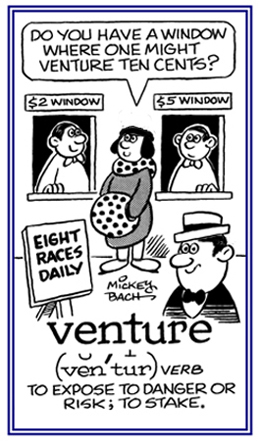ven-, vent-, veni-, ventu-
(Latin: come, coming)
venture (verb), ventures; ventured; venturing
1. To undertake the risks or dangers of a particular task or project: Because little Martin wanted to venture out into the snow for the first time, his mother had to dress him in warm clothes and put on his new snow boots.
2. To offer or to express something tentatively with the possibility of being contradicted, embarrassed, or ignored: Tim was quite shy in class but ventured to raise his hand and hoped he had the correct answer!
3. To expose money or property by committing it to a particular project: Steven decided to venture some of his capital in the business knowing that he was hazarding a loss or, hopefully, a real gain of profits!
4. Etymology: from Latin venire, "to happen."

© ALL rights are reserved.

© ALL rights are reserved.
Go to this Word A Day Revisited Index
2. To offer or to express something tentatively with the possibility of being contradicted, embarrassed, or ignored: Tim was quite shy in class but ventured to raise his hand and hoped he had the correct answer!
3. To expose money or property by committing it to a particular project: Steven decided to venture some of his capital in the business knowing that he was hazarding a loss or, hopefully, a real gain of profits!
4. Etymology: from Latin venire, "to happen."


Go to this Word A Day Revisited Index
so you can see more of Mickey Bach's cartoons.
Money used for investment in projects that involve a high risk but offer the possibility of large profits; risk capital: Some groups or individual persons who invest venture capital in a new enterprise, hope very much that their financial backing will pay off someday!
There are some startups where venture capital helped firms to be successful, like WhatsApp and Spotify.
1. In business, a person who begins a new business enterprise: Greg, a venturer, decided to share in a brand new business endeavour.
2. An individual who embarks on a journey or daring trip; adventurer: Tom's father turned out to be a venturer when he undertook a bike tour around the world.
2. An individual who embarks on a journey or daring trip; adventurer: Tom's father turned out to be a venturer when he undertook a bike tour around the world.
venturesome (adjective), more venturesome, most venturesome
1. Descriptive of a person or an animal that is willing to take risks or have new experiences; adventurous: Fairy tales are full of venturesome knights trying to save beautiful ladies in danger.
2. Pertaining to something that involves risk or danger; hazardous: The venturesome expedition was taken on by a group of young men and women wanting to climb up Mr. Everest.
2. Pertaining to something that involves risk or danger; hazardous: The venturesome expedition was taken on by a group of young men and women wanting to climb up Mr. Everest.
venturesomely (adverb), more venturesomely, most venturesomely
Regarding how an animal or a person takes risks and is bold; adventurously: The little kitten crept venturesomely through the tall grass in the garden.
The quality or state of being bold or courageous: Somehow Raymond always wanted to take the easy way of living and there was a big slump in venturesomenessin his existence because he didn't like exerting himself or taking any risks.
venturous (noun), more venturous, most venturous
Pertaining to someone who is bold, fearless, or unafraid: When Jenny was a toddler, she was very venturous in the forest behind the house.
venturously (adverb), more venturously, most venturously
Descriptive of how a person or an animal displays boldness or is daring: James dived venturously into the extremely cold lake for the very first time.
Concerning a person's inclination to tackle potentially dangerous undertakings; fearlessness: Sam certainly had had the willingness to take on great risks and this venturousness cost him his life in the end.
1. A location where an event takes place, such as a sports competition or a concert: This particular meaning of venue refers to the place where happenings are often held and originates from Latin venio, through French, "a coming".
2. A site in which a crime takes place or a cause of action arises, as well as a statement that a case is being brought to the proper court or authority: A "change of venue" is a substitution of another place for a trial, as when the jury or court might be prejudiced for or against a defendant.
3. Etymology: This second venue literally means, "neighborhood" and it comes from Latin vicinus, "neighboring, near" which is from another Latin form, vicus, meaning "district, village".
2. A site in which a crime takes place or a cause of action arises, as well as a statement that a case is being brought to the proper court or authority: A "change of venue" is a substitution of another place for a trial, as when the jury or court might be prejudiced for or against a defendant.
3. Etymology: This second venue literally means, "neighborhood" and it comes from Latin vicinus, "neighboring, near" which is from another Latin form, vicus, meaning "district, village".
Volventibus annis. (Latin phrase)
With the years rolling on.
Also: "As time goes by."

